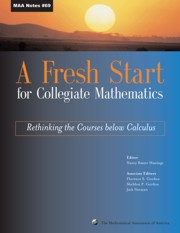Book contents
- Frontmatter
- Preface
- Contents
- Introduction
- Background
- Theme 1 New Visions for Introductory Collegiate Mathematics
- Theme 2 The Transition from High School to College
- Theme 3 The Needs of Other Disciplines
- Theme 4 Student Learning and Research
- Theme 5 Implementation
- Theme 6 Influencing the Mathematics Community
- Ideas and Projects that Work: Part 1
- Ideas and Projects that Work: Part 2
Preface
- Frontmatter
- Preface
- Contents
- Introduction
- Background
- Theme 1 New Visions for Introductory Collegiate Mathematics
- Theme 2 The Transition from High School to College
- Theme 3 The Needs of Other Disciplines
- Theme 4 Student Learning and Research
- Theme 5 Implementation
- Theme 6 Influencing the Mathematics Community
- Ideas and Projects that Work: Part 1
- Ideas and Projects that Work: Part 2
Summary
This volume is an outcome of the NSF-funded conference, “Rethinking the Preparation for Calculus,” which took place in Washington, DC, in October 2001. Approximately 50 mathematicians were invited to attend the conference, which was organized by Jack Narayan (SUNY Oswego), with support from members of the steering committee: Steven Dunbar (University of Nebraska-Lincoln), Sheldon Gordon (Farmingdale State University of New York), Christopher Hirsch (Western Michigan University), Jo Ann Lutz (North Carolina School of Science and Mathematics) and myself, Nancy Baxter Hastings (Dickinson College).
As the name of the conference implies, the purpose was to rethink the preparation for calculus. All of us were aware, as Jack Narayan writes in his paper describing the conference, “in general, only a small percentage of students who take precalculus courses ever go on to take calculus and many of them who do are not particularly well-prepared for calculus and never complete the course.” As organizers of the conference, we hoped to establish some principles for changing the precalculus offerings, provide guidance to the mathematics community, and focus attention on the problems and needs in the area of precalculus. In preparation for the conference, we invited participants to submit discussion papers organized around the following themes: Precalculus Reform, Student Learning and Research, Changes in College Algebra, Transition from High School to College, Needs of Other Disciplines, Technology, Implementation, and Influencing the Mathematics Community. Our plan was to collect these papers in a proposed volume for the MAA Notes Series.
- Type
- Chapter
- Information
- A Fresh Start for Collegiate MathematicsRethinking the Courses below Calculus, pp. vii - viiiPublisher: Mathematical Association of AmericaPrint publication year: 2006

